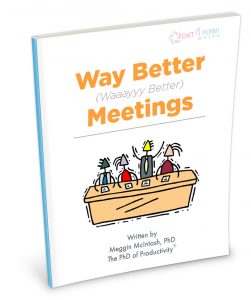Better Meetings Now! by Meggin McIntosh, PhD
 Thanks to Reed Richardson for permission to use his ideas from the November/December 2007 issue of Priority Magazine. Get rid of the conference room blues by following these 10 tips:
Thanks to Reed Richardson for permission to use his ideas from the November/December 2007 issue of Priority Magazine. Get rid of the conference room blues by following these 10 tips:
-
First, change your thinking. If you ever find yourself or others saying “Meetings over, let’s get back to work,” you have a perception problem. Meetings are work and should be treated accordingly (i.e., people show up on time, are prepared, stay engaged, and get something accomplished by the end).
-
Invite participants, not an audience. If some regular attendees to your meetings never speak or get called upon, ask yourself why they’re there. Another telltale sign of the unproductive, over-attended meetings: The attendees far out-number the seats around the conference table.
-
Consider the cost. Meetings are expensive endeavors when you add up the time and salaries of everyone involved – another good reason to scrutinize the attendance list. (Meetings expert and business author Steve Kaye estimates businesses waste 20% of their professional payroll on bad meetings.) In the end, your meetings should directly translate into tangible gains (more profits, leaner operations, etc).
-
No agenda = no meeting. It can’t be overstated – a clear, concise agenda (distributed at least a day in advance) is the key to more effective meetings. It lets everyone know where to start and what you want to achieve by meeting’s end. It maintains focus, blunts digressions, and drives decisions. And, by letting invitees know ahead of time what’s going to be discussed, it serves as an additional check against over-attendance.
-
Don’t be a time bandit. Meetings should have a start and end time. This will allow your employees to be more productive in scheduling their other tasks. A good idea: Assign whoever keeps the minutes to act as your meeting’s time-keeper as well.
-
On task means offline. If you want full participation, you need undivided attention and that means limiting, if not outright banning, smartphones and laptops. To accommodate this policy, you should also allow one ten-minute break every hour so attendees can check messages and send quick emails.
-
Don’t start the day with a meeting. Because people tend to be more productive in the mornings, it’s best to let them work on their own, rather than attend meetings, during this critical period. Instead, shoot for right before lunch or near the end of the day to keep your meetings from dragging on too long.
-
To graze or not to graze. Opinions about providing snacks at meetings are mixed. Some experts say they help build collegiality and sustain higher energy levels. Critics say they can quickly turn a productive meetings into an unfocused social function where either nothing gets done or the snacks go to waste.
-
Avoid the “Fortress of Solitude”. While you want your meetings to be free from everyday hustle and bustle, it’s not a good idea to make long-term business decisions in a vacuum. Consequently, it’s recommended that you store up-to-date information on all of your business’s key metrics (sales charts, production data, project deadlines, etc.) in the conference room for easy reference.
-
Two for the road; Every meeting should end with same two items – a review of all the decisions made and action items assigned (with corresponding deadlines) as well as a quick but genuine after-action review of how the meeting went and any areas of improvement for next time.
Great information, isn’t it? I plan to share this article from Reed Richardson (Priority Magazine) far and wide and I hope you do, too. Just forward this to colleagues or print this page and have a discussion about it at your next…meeting.
 If you attend &/or plan meetings (and I know you do), then you need the Get a Plan! Guide® to Waayy Better Meetings. As a society, we cannot afford to be losing productivity to meetings that are poorly designed, unnecessary, or to whom the wrong people have been invited.
If you attend &/or plan meetings (and I know you do), then you need the Get a Plan! Guide® to Waayy Better Meetings. As a society, we cannot afford to be losing productivity to meetings that are poorly designed, unnecessary, or to whom the wrong people have been invited.




